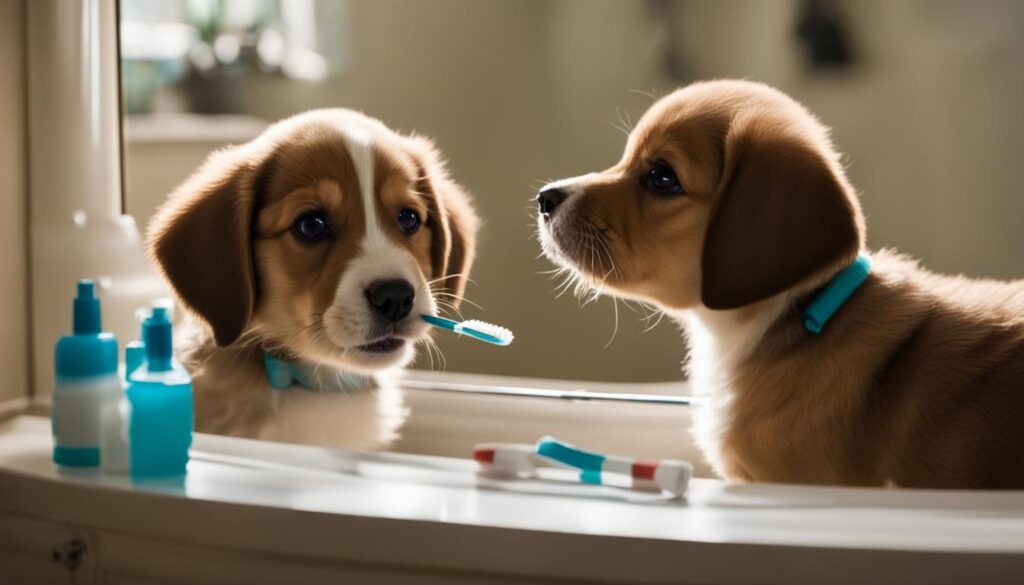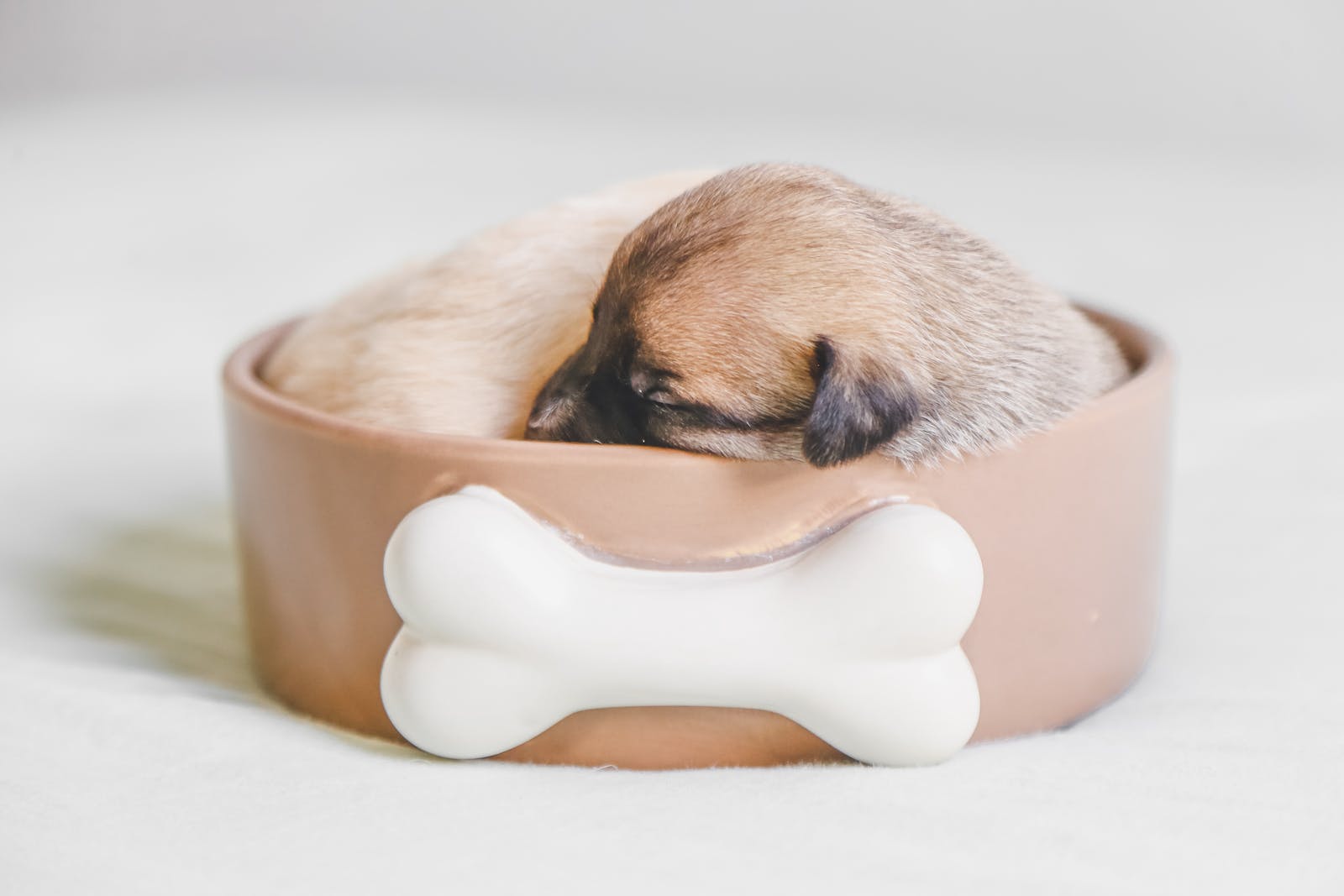Congratulations on deciding to welcome a new puppy into your life! In this guide, we will provide you with a comprehensive puppy teething age chart to help you navigate your pup’s growth. Teething is an important milestone in your puppy’s development, and understanding the different stages and symptoms can help you provide the necessary care and support during this time. We have compiled information from various sources to give you a complete overview of the puppy teething process and how to ensure your pup’s dental health.
- When Do Puppies Start Teething? A Timeline of the Teething Process
- Puppy Teething Symptoms: Signs to Watch Out For
- Managing Puppy Teething: Remedies and Toys
- Dental Care for Your Teething Puppy: Tips for Healthy Teeth
- Breed-Specific Dental Development: What to Expect
- When to Consult a Vet for Puppy Teeth Issues
- Financial Considerations of Puppy Teething
- Comforting Your Teething Puppy: Holistic Approaches
- Caring for Your Puppy's Teeth: Establishing Healthy Habits
- Conclusion
- FAQ
- Source Links
Key Takeaways:
- The puppy teething age chart is a valuable tool to track your puppy’s dental development.
- Puppies start teething at around 2 weeks old, and by 6 to 8 months, they should have all their adult teeth.
- Common teething symptoms in puppies include chewing, drooling, and irritability.
- Providing teething toys and using gentle remedies can help alleviate your puppy’s discomfort.
- Establishing healthy dental habits early on is crucial for your puppy’s long-term dental health.
When Do Puppies Start Teething? A Timeline of the Teething Process
Puppies begin teething at around 2 weeks old when their baby teeth start to come in. By the age of 8 weeks, they should have all of their baby teeth, which total about 28. The teething process continues as the puppy’s adult teeth start to emerge and replace the baby teeth. This typically occurs between 3 to 6 months of age. By the time a puppy is 6 to 8 months old, they should have all 42 of their adult teeth. It’s important to monitor your puppy’s teeth during this time and address any issues or concerns with your veterinarian.
During the teething process, your puppy may experience some discomfort and exhibit certain behaviors. They may chew on objects to relieve the discomfort of their gums, and you may notice increased drooling. It’s also common for puppies to have a temporary decrease in appetite during the teething stages. However, every puppy is different, and not all will show the same symptoms. It’s important to pay attention to your individual puppy’s behavior and consult with your veterinarian if you have any concerns.
Teething can be a challenging time for both puppies and their owners, but there are strategies you can employ to help alleviate your puppy’s discomfort. Providing them with appropriate teething toys can help satisfy their urge to chew while soothing their sore gums. Frozen washcloths or treats can also provide relief. It’s essential to choose toys that are safe for your puppy’s size and to supervise their chewing habits. Additionally, regular veterinary check-ups and dental care are crucial for monitoring your puppy’s teething progress and ensuring their dental health.
| Teething Stage | Age | Teeth Development |
|---|---|---|
| Baby Teeth | 2-8 weeks | 28 baby teeth emerge |
| Adult Teeth | 3-6 months | Adult teeth start to emerge and replace baby teeth |
| Complete Dentition | 6-8 months | All 42 adult teeth present |
As your puppy goes through the teething process, it’s important to provide them with appropriate care and support. By understanding the timeline of teething and being aware of the common symptoms, you can help ensure your puppy’s dental health. Remember to consult with your veterinarian for personalized advice and guidance throughout this exciting stage of your puppy’s development.
Puppy Teething Symptoms: Signs to Watch Out For
During the teething process, puppies may exhibit various symptoms that indicate discomfort and changes in their behavior. Recognizing these signs is essential for providing appropriate care and support. Here are some common teething symptoms to watch out for:
- Chewing on objects: Puppies often chew on objects to relieve the discomfort caused by teething. You may notice them gnawing on furniture, shoes, or even their own toys more frequently.
- Drooling: Excessive drooling is another common symptom of teething in puppies. You may observe a noticeable increase in their saliva production, leading to wet spots around their mouth.
- Loss of appetite: Teething can sometimes cause puppies to have a decreased appetite. They may be less interested in their regular meals or show reluctance to eat hard food due to gum soreness.
- Bleeding gums: As the puppy’s baby teeth begin to fall out and make way for the adult teeth, you may notice slight bleeding or redness in their gums. This is a normal part of the teething process.
- Irritability: Puppies may experience mood swings and become more irritable during the teething phase. They may be more prone to whining, fussiness, or irritability due to the discomfort they are experiencing.
It’s important to note that not all puppies will exhibit all of these symptoms. Each puppy is unique, and their experience with teething may vary. However, if you notice any significant changes in your puppy’s behavior or have concerns about their teething process, it’s always a good idea to consult with your veterinarian for guidance and reassurance.
| Teething Symptom | Description |
|---|---|
| Chewing on objects | Puppies may chew on objects to alleviate teething discomfort. |
| Drooling | Teething can cause excessive drooling in puppies. |
| Loss of appetite | Puppies may have a reduced appetite during the teething process. |
| Bleeding gums | Some bleeding or redness in the gums is normal as puppy teeth fall out. |
| Irritability | Puppies may become more irritable and prone to mood swings during teething. |
By keeping an eye out for these teething symptoms, you can better understand and address your puppy’s needs during this important stage of their development. Providing appropriate chew toys, implementing soothing remedies, and offering comfort can help ease their discomfort and ensure they have a smooth transition into adulthood.
Managing Puppy Teething: Remedies and Toys
During the teething process, puppies experience discomfort and soreness in their gums. Fortunately, there are several remedies and toys that can help alleviate their discomfort and provide relief. By providing your teething puppy with appropriate chew toys and implementing various remedies, you can help them navigate this stage more comfortably.
One effective remedy for teething puppies is providing them with safe chew toys specifically designed for this purpose. These toys are made from durable materials that can withstand the puppy’s chewing and help relieve gum soreness. It’s important to choose toys that are suitable for your puppy’s size and supervise their chewing habits to prevent any accidents or choking hazards.
In addition to chew toys, frozen washcloths can also provide relief for teething puppies. Simply wet a washcloth, freeze it, and give it to your puppy to chew on. The coldness of the washcloth can help numb their gums and reduce inflammation, providing them with temporary relief.
Gentle gum massages can also be an effective way to alleviate teething discomfort. Using your finger, gently rub your puppy’s gums in a circular motion. This can help soothe their sore gums and provide a comforting sensation. Remember to use gentle pressure and be cautious of your puppy’s comfort level during the massage.
| Remedies | Benefits |
|---|---|
| Safe chew toys | Helps satisfy chewing urges and relieve gum soreness |
| Frozen washcloths | Provides numbing effect and reduces gum inflammation |
| Gentle gum massages | Soothes sore gums and provides comfort |
By incorporating these remedies and toys into your teething puppy’s routine, you can help manage their discomfort and ensure a smoother transition to adulthood. Remember to always supervise your puppy during playtime and consult with your veterinarian if you have any concerns or questions regarding your puppy’s teething process.
Dental Care for Your Teething Puppy: Tips for Healthy Teeth
During your puppy’s teething process, it is crucial to prioritize their dental care to ensure healthy teeth and gums as they grow. By implementing a few simple tips, you can contribute to your puppy’s overall dental health and set them up for a lifetime of strong teeth. Here are some key practices to consider:
1. Regular Brushing:
Start a regular brushing routine from an early age to get your puppy accustomed to the process. Use a soft-bristled toothbrush and dog-specific toothpaste to gently brush their teeth at least two to three times a week. This helps prevent tartar buildup, plaque formation, and gum disease.
2. Appropriate Dental Products:
Invest in dental products specifically designed for puppies, such as toothbrushes, toothpaste, and dental wipes. These products are formulated to be safe for your puppy and effectively clean their teeth without causing any harm or discomfort.
3. Dental Treats:
Provide your puppy with dental treats that are designed to promote oral hygiene. These treats are usually textured or have special ingredients that help reduce plaque and tartar buildup. However, it’s important to choose treats that are appropriate for your puppy’s size and age.
Remember, a healthy dental routine is an ongoing commitment. Regular veterinary check-ups, professional dental cleanings, and open communication with your veterinarian are crucial to addressing any dental issues and maintaining your puppy’s oral health.
| Benefits of Dental Care for Puppies: |
|---|
| 1. Prevents dental disease |
| 2. Reduces bad breath |
| 3. Promotes overall health |
| 4. Avoids costly dental procedures |
Breed-Specific Dental Development: What to Expect
Understanding the breed-specific dental development of your puppy is crucial for providing the best possible care. Different breeds may have variations in their dental timeline, so it’s important to be aware of what to expect. Here’s a look at how dental development can differ among breeds:
Small Breed Dogs
Small breed puppies typically have a faster dental development compared to larger breeds. Their puppy teeth usually start erupting around 2 to 3 weeks of age, and by 8 weeks, they generally have all their baby teeth. The transition to adult teeth usually occurs between 3 to 4 months of age, and by 7 to 8 months, they should have all their permanent teeth. It’s important to provide appropriate chew toys and monitor their dental health during this period.
Medium and Large Breed Dogs
Medium and large breed puppies may have a slightly different dental development timeline. Their baby teeth usually start appearing around 3 to 4 weeks of age, and by 12 to 16 weeks, they should have all their deciduous teeth. The transition to adult teeth typically begins around 4 to 6 months, with all permanent teeth present by 7 to 8 months. It’s important to ensure proper oral hygiene and provide appropriate chew toys for these breeds.
Remember, these timelines are general guidelines, and individual puppies may have variations. Consult with your veterinarian and breed-specific resources to get a better understanding of your puppy’s dental development.
When to Consult a Vet for Puppy Teeth Issues
While most puppies go through the teething process without any major issues, there are times when dental problems can arise. It’s important to be aware of the signs that indicate a need to consult a veterinarian for your puppy’s teeth. If you notice delayed tooth eruption, broken teeth, discolored teeth, or abnormal tooth growth, these can all be indications of dental issues that require professional intervention.
A veterinarian will be able to assess your puppy’s dental health and provide appropriate treatment if needed. They may recommend dental x-rays to get a closer look at your puppy’s teeth and identify any underlying problems. Early intervention is key in addressing dental issues in puppies, as untreated problems can lead to pain, infection, and further complications down the line.
In addition to dental issues, your veterinarian can also address any concerns or questions you have about your puppy’s teething process. They can provide guidance on teething remedies, appropriate chew toys, and other aspects of dental care. Regular check-ups with a veterinarian are essential for maintaining your puppy’s dental health and ensuring they have a happy and comfortable teething experience.
When to Consult a Vet for Puppy Teeth Issues:
- Delayed tooth eruption
- Broken teeth
- Discolored teeth
- Abnormal tooth growth
Remember, you play a vital role in your puppy’s dental health by monitoring their teeth and seeking veterinary assistance when necessary. By doing so, you can help ensure your puppy grows up with a healthy smile and overall well-being.

Financial Considerations of Puppy Teething
Welcoming a new puppy into your life is an exciting time, but it’s important to be aware of the financial implications that come with puppy teething. From chew toys to veterinary check-ups, these expenses can add up.
One of the main financial considerations is investing in quality chew toys for your teething puppy. These toys are designed to help relieve gum soreness and satisfy their urge to chew. It’s essential to choose toys that are safe and appropriate for your puppy’s size to prevent any accidents or choking hazards.
Regular veterinary check-ups are another important aspect of puppy teething. These visits are crucial for monitoring your puppy’s dental development and addressing any issues or concerns that may arise. While the cost of veterinary care can vary, it’s important to budget for these check-ups to ensure your puppy’s dental health.
| Expense | Estimated Cost |
|---|---|
| Chew Toys | $20 – $50 |
| Veterinary Check-ups | $50 – $100 per visit |
| Total | $70 – $150 (estimated) |
Aside from these expenses, it’s also important to consider potential damage to household items from your puppy’s increased chewing urges. This may include furniture, shoes, or other personal belongings. Taking precautions and providing appropriate toys and outlets for chewing can help minimize these costs.
By planning and budgeting for the financial aspects of puppy teething, you can ensure that you can provide the necessary care and support for your teething puppy. Remember, these expenses are a temporary part of your puppy’s development, and with proper care, their dental health will flourish as they grow into their adult teeth.

Comforting Your Teething Puppy: Holistic Approaches
Teething can be a challenging time for both puppies and their owners. Fortunately, there are several holistic approaches you can try to help comfort your teething puppy and alleviate their discomfort. These natural remedies can be a complement to other teething remedies and provide soothing relief for your furry friend.
Chew Toys with a Cooling Effect
One holistic approach to comforting a teething puppy is to provide them with chew toys that have a cooling effect. These toys can help numb your puppy’s gums and reduce inflammation. Look for toys that are safe for teething puppies and can be chilled in the freezer. The cold temperature can provide temporary relief and help soothe your puppy’s sore gums. Remember to always supervise your puppy while they are using a chew toy to ensure their safety.
Herbal Remedies
Some herbal remedies can also provide natural relief for your teething puppy. Chamomile tea, for example, has anti-inflammatory properties and can help soothe your puppy’s gums. Brew a weak chamomile tea, let it cool, and then soak a clean cloth in the tea. Gently massage your puppy’s gums with the cloth to provide relief from gum soreness. It’s important to use herbal remedies in moderation and consult with your veterinarian before trying any new treatments.
Gentle Gum Massages
Gentle gum massages can be an effective way to provide relief for your teething puppy. Using clean hands or a soft cloth, apply gentle pressure to your puppy’s gums in a circular motion. This can help alleviate discomfort and promote healthy blood flow to the gums. Just like with any massage, it’s important to be gentle and responsive to your puppy’s comfort level. If your puppy becomes agitated or shows signs of distress, stop the massage and try a different approach.

Remember, every puppy is unique, and what works for one may not work for another. It’s important to observe your puppy’s behavior and consult with your veterinarian for guidance. By utilizing these holistic approaches and providing the necessary care and support, you can help your teething puppy navigate this uncomfortable phase with comfort and ease.
Caring for Your Puppy’s Teeth: Establishing Healthy Habits
Now that you know all about the puppy teething process and how to alleviate your puppy’s discomfort, it’s important to establish healthy dental habits to ensure their long-term oral health. By incorporating these habits into your puppy’s routine, you can help prevent dental issues and promote strong teeth and gums as they grow into adult dogs.

Regular Brushing
One of the most important habits you can establish is regular brushing. Start by introducing your puppy to the toothbrush and toothpaste early on to get them used to the process. Use a soft-bristled toothbrush specifically designed for dogs and a toothpaste that is safe for pets. Brushing your puppy’s teeth at least three times a week will help remove plaque and prevent tartar buildup, reducing the risk of gum disease.
Proper Diet
A balanced diet is essential for your puppy’s overall health, including their dental health. Feed them high-quality dog food that supports oral health and includes nutrients like calcium for strong teeth and gums. Avoid feeding your puppy table scraps or sugary snacks, as they can contribute to tooth decay. Talk to your veterinarian about the best diet for your puppy’s specific needs.
Regular Veterinary Check-ups
Regular veterinary check-ups are crucial for monitoring your puppy’s dental development and ensuring any issues are addressed early on. Your veterinarian can perform a thorough examination of your puppy’s teeth and gums, provide professional dental cleanings if necessary, and offer guidance on maintaining their dental health at home.
Dental Care Products
In addition to regular brushing, you can incorporate dental care products into your puppy’s routine to promote good oral hygiene. Dental treats and chews specifically designed to clean teeth can help reduce plaque and freshen your puppy’s breath. There are also water additives and dental sprays available that can help prevent tartar buildup and reduce the risk of gum disease. Consult with your veterinarian to determine the best dental care products for your puppy.
By establishing these healthy dental habits early on, you can set your puppy up for a lifetime of good oral health. Remember to be patient and gentle when introducing new dental care routines to your puppy, and always consult with your veterinarian if you have any concerns or questions along the way. With proper care and attention, your puppy will have a bright and healthy smile for years to come!
Conclusion
Congratulations on making it through your puppy’s teething journey! By following the puppy teething age chart and implementing the tips and remedies mentioned in this guide, you are well-equipped to navigate your pup’s growth and maintain their dental health.
Teething in puppies is a natural process that requires patience and understanding. By recognizing the signs of teething and providing appropriate care, such as offering teething toys and soothing remedies, you can help alleviate your puppy’s discomfort and promote healthy dental development.
Remember that dental care for puppies is an ongoing commitment. Regular veterinary check-ups, proper dental hygiene practices, and a balanced diet will contribute to your puppy’s overall oral health. By establishing these habits early on, you are laying the foundation for a lifetime of healthy teeth and a happy, confident dog.
Enjoy this exciting time with your teething puppy, and cherish the moments as they grow into their adult teeth. If you have any concerns or questions along the way, don’t hesitate to consult with your veterinarian for guidance and support. Your puppy’s dental health is an important aspect of their overall well-being, and your dedication to their care will ensure a bright and healthy future.
FAQ
When do puppies start teething?
Puppies start teething at around 2 weeks old when their baby teeth start to come in.
How many baby teeth do puppies have?
By the age of 8 weeks, puppies should have all of their baby teeth, which total about 28.
When do puppies get their adult teeth?
Puppies’ adult teeth start to emerge and replace the baby teeth between 3 to 6 months of age. By 6 to 8 months old, they should have all 42 of their adult teeth.
What are the symptoms of teething in puppies?
Common symptoms of teething in puppies include chewing on objects, drooling, loss of appetite, bleeding gums, and irritability.
How can I help alleviate my puppy’s teething discomfort?
Providing your puppy with safe chew toys, frozen washcloths, frozen treats, and gentle gum massages can help alleviate teething discomfort.
How can I take care of my puppy’s dental hygiene?
Regular brushing with a soft-bristled toothbrush and dog-specific toothpaste, along with dental treats and supplements, can help maintain your puppy’s dental hygiene.
Are there breed-specific dental development differences?
Yes, different breeds may have slightly different timelines for dental development, so it’s important to understand your puppy’s breed-specific dental timeline for proper care.
When should I consult a vet for any puppy teeth issues?
If you notice delayed tooth eruption, broken teeth, discolored teeth, or abnormal tooth growth, it’s important to consult a veterinarian for professional intervention.
What financial considerations should I keep in mind during puppy teething?
Investing in quality chew toys, dental treats, and regular veterinary check-ups can add up in terms of expenses, so it’s important to plan and budget for these costs.
Are there any holistic approaches to comfort a teething puppy?
Yes, cold chew toys, natural remedies like chamomile tea, and gentle gum massages can provide relief from gum soreness for your teething puppy.
How can I establish healthy dental habits for my puppy?
Regular brushing, a balanced diet, and appropriate dental care products can help establish healthy dental habits for your puppy from an early age.




